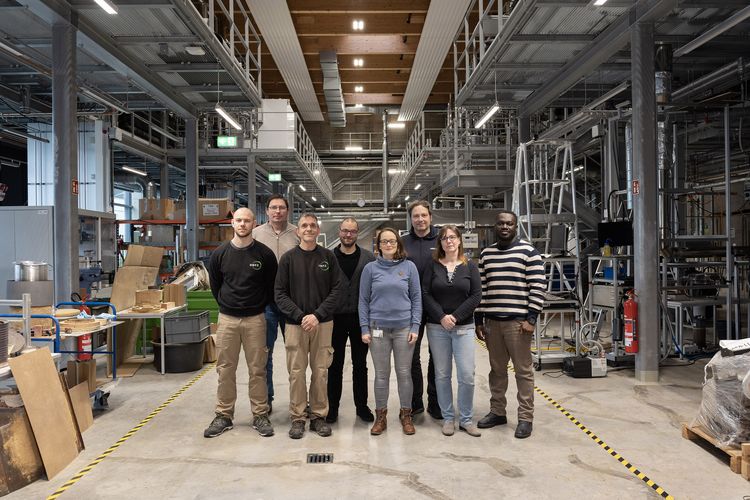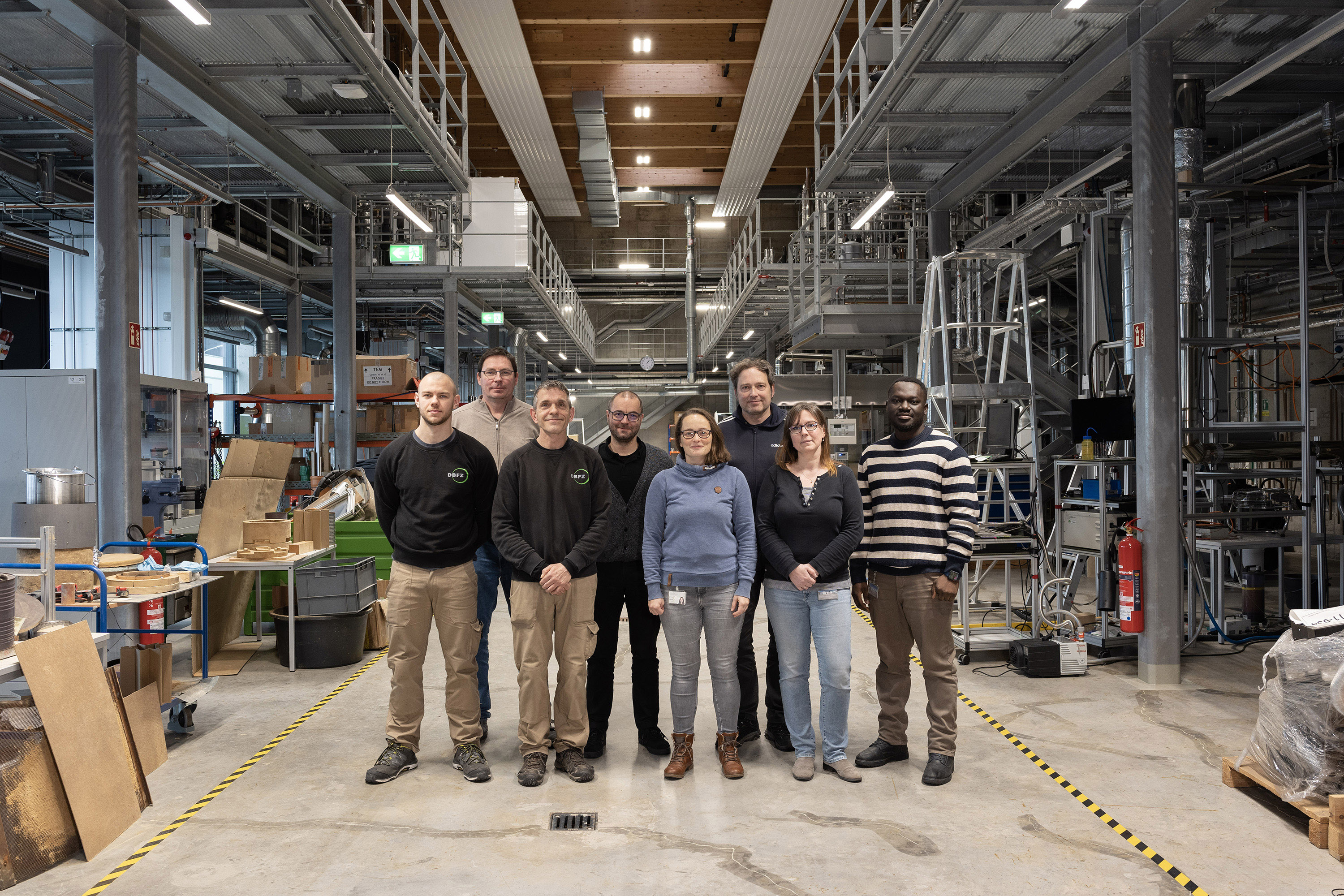Topics of the Working group
The Small Plant Technology working group aims to develop and optimise thermo-chemical conversion systems as well as necessary secondary emission reduction measures. The aim is to reduce the pollutant emission level to such an extent that the health and environmentally relevant WHO emission standards can be met both locally and globally. Another aim is to utilise the available biomass resources as sustainably as possible. In line with the goal to establish a circular economy, processes and methods are being developed that combine material and energetic biomass utilisation. A particular focus here is the production of inorganic value elements from residues of thermo-chemical conversion, such as biosilica from biomass rich in silicon.
Focus topics of the working group:
- Development and optimisation of flexibly operable and low-emission manually fed as well as automatic biomass solid fuel combustion systems with a heat output range of up to 400 kW (single-room heaters and boilers)
- Development and optimisation of catalytic emission reduction processes
- Optimisation, characterisation and integration of further emission reduction measures in thermochemical biomass conversion systems (control systems, precipitators)
- Characterisation of small combustion systems (according to standards for single-room heaters, boilers and cookers)
- Characterisation of catalysts and porous materials
- Development of processes and methods for extraction and use of value elements out of conversion residues from thermo-chemical conversion processes
- Recycling of catalysts and filter materials
Prof. Dr rer. nat. Ingo Hartmann is head of the Research Focus Area Catalytic Emission Control at the DBFZ. He has been working at the DBFZ in the Thermo-Chemical Conversion department since 08/2008. From 1998 to 2002, he studied at the HTWK Leipzig, graduating with a degree in energy technology and environmental engineering. From 2003 to 2007, he completed his doctorate in chemistry at the University of Leipzig. From 2002 to 2003 he was a research assistant at the Helmholtz Centre for Environmental Research GmbH and from 2006 to 2008 at the HTWK Leipzig. In November 2020, he began working as an honorary professor for air pollution control technology at HTWK Leipzig. Since October 2023, he has held the deputy professorship for environmental technology at HTWK Leipzig.
Dr Mirjam Müller studied energy and environmental engineering at the HTWK Leipzig. Since 2010, she has been working on various aspects of emission reduction and process technology in the field of biomass combustion. A particular focus of her work was the application and integration of catalysts as part of her cooperative doctorate completed in 2020 at the Faculty of Chemistry and Mineralogy at Leipzig University together with the HTWK Leipzig Faculty of Mechanical and Energy Engineering and the DBFZ. Since then, she has been working as a post-doc at DBFZ and is the provisional head of the Small Plant Technology working group since December 2023. She is currently working on a project to develop pyrolysis cookers for Ethiopia and also on various projects to characterise and reduce particulate emissions from small combustion systems.
Dr Bettina Stolze studied chemistry and completed her doctorate in the field of heterogeneous catalysis at the University of Leipzig. Since 2015, she has been a member of the Small Plant Technology working group, where her research focuses on catalytic exhaust gas aftertreatment to reduce pollutants after thermo-chemical conversion of biogenic fuels. Taking into account the SDG (Sustainable Development Goals), new catalysts are synthesised, characterised and catalytically tested in both model gas and real exhaust gas. A sustainable approach for these catalysts is the use of biogenic silica as a catalyst carrier, which is obtained from biogenic residues and waste materials through thermo-chemical conversion.
René Bindig studied ‘Chemistry’ at the University of Leipzig. In his master's thesis, he focussed on microwave-assisted catalytic post-combustion in small combustion plants. Since 2011, he has been working as a research assistant in the Thermo-Chemical Conversion department, working group ‘Small Plant Technology’. He leads several research projects in which he is involved in the development of low-emission small combustion plants and corresponding emission reduction technologies. He is currently working on his doctorate in cooperation with the University of Halle on the topic of ‘Processes for the development of catalysts for exhaust gas aftertreatment in small combustion plants’.
Mario König deals with measures for primary and secondary emission reduction at small and medium-sized combustion plants. One focus of his work at the DBFZ is research into secondary measures for the reduction of dust, NOX, SO2, HCl and PCDD/PCDF in combustion plants fuelled with biogenic residues in the output range from 100 kW to 5 MW thermal output. Dust separators, SCR processes and sorption processes and combinations of these are used. He started his scientific work at the DBFZ at the beginning of 2011 after completing his degree in environmental engineering at TU Dresden. He maintains a research cooperation with the University of Talca (Faculty of Engineering) in Chile and has already spent three longer research stays there. He is currently working on his doctorate in cooperation with the University of Halle on the topic of ‘Development and application of novel SCR catalysts for the low-temperature denitrification of waste gases from the thermochemical conversion of biogenic solid fuels’.
Thomas Schliermann studied physics at the University of Würzburg. As a research assistant, he focussed on porous carbons, electrochemical energy storage and nanomaterials for hydrogen storage. At the same time, he worked at the Bavarian Centre for Applied Energy Research (ZAE Bayern) in Würzburg on the production and characterisation of carbon nanofibres. There he was able to deepen his knowledge of characterisation methods such as gas sorption, X-ray diffraction and small-angle X-ray scattering as well as Raman spectroscopy. Since 2015, he has been working as a research associate at the DBFZ on issues relating to the material and energy utilisation of agricultural residues such as rice husks. The focus here is on material synthesis, property optimisation and characterisation of biogenic silica based on silicon-rich ashes. His area of responsibility is rounded off by development projects to reduce emissions and international co-operation.
Dr Clement Owusu Prempeh is a process engineer and postdoctoral researcher. He has been at the DBFZ since 2020, where he is working on the chemical pre-treatment of biomass residues from food production and their combustion properties for heat utilisation. He completed his doctorate in 2024 at the University of Rostock in the field of environmental technology. His contributions in this field include publications such as ‘Comparative Study of Commercial Silica and Sol-Gel-Derived Cornhusk Silica as Supports for Low-Temperature Catalytic Methane Combustion’, which investigates the synthesis and characterisation of biogenic silica as a support for low-temperature catalytic methane combustion. Dr Owusu's current project focuses on transformative research involving the development of pyrolysis cookstoves for the Ethiopian community, aiming to produce nutrient-rich biochar to improve soil fertility and food security in Ethiopia.
David Reitmajer has been working as a doctoral student at the DBFZ since April 2025. He completed his bachelor's degree in process and environmental engineering at the HTWG Konstanz and subsequently completed a master's degree in building, energy and environmental engineering at the HTWK Leipzig in 2024. In the BioSmoke project, he is working on the investigation and model-based description of natural combustion processes of wildfires with regard to their fire behaviour, as well as the generation and reduction of associated emissions. The aim is to develop a CFD prediction model and validate it by characterising emissions from various representative fuel mixtures.

